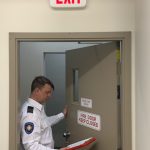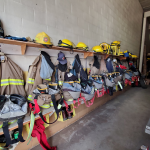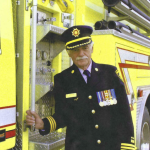This blog is intended to provide specific tips that will give people who have physical limitations the peace of mind that they have done as much as is reasonable and practical to prepare for an emergency event at their residence.
Emergency Kit Checklist for people with disabilities
There are many checklists out there which outline what one should have in a personal emergency kit. The following is a list of items to consider having in the case of an emergency:
- Flashlight and spare batteries
- A telephone that can work during a power disruption
- Important papers, including those that will provide personal identification
- Bottled water
- Clothing and footwear
- Blankets
- Toiletry and other personal items
- Medication
- Backpack/sports bag
These items may not apply to every situation or every person, but they are designed to make one think what they would need in the event they have to leave their home quickly at any time of the day.
Helpful tips
- Ensure all emergency kit items are organized in one place, easy to access and easy for someone to carry.
- Have special needs equipment tagged, including instructions, on how to use or move each assistive device during an emergency?
- Complete a checklist of items in the emergency kit and a personal assessment sheet, outlining any mobility and agility limitations. Provide a copy to family members, caregivers and others who may visit frequently. Keep a copy in the emergency kit.
- If there are food or medication allergies, consider wearing a MedicAlert® bracelet or necklace.
- List all food/drug allergies and current medications (for each medication, specify the medical condition being treated, the generic name, dosage, frequency, and the name and contact information of the prescribing physician) as with the checklist of items in the emergency kit. A copy of this list should also be given to family members, caregivers and others who may visit frequently and keep a copy in the emergency kit.
- If life-sustaining equipment or regular attendant care is relied on, key contacts should be prepared to check in on the individual immediately if an emergency occurs. It is recommended that there is an emergency backup plan in place in the event of a power outage.
- Carry a personal alarm that emits a loud noise to draw attention.
- It is recommended that emergency kits are checked twice a year to ensure the contents are up to date
Being prepared
People with disabilities/special needs are encouraged to adapt their emergency kits to their own needs. The lists presented here are just some examples of how to prepare for an emergency.
An excellent link for more information on this topic: Click Here.
Questions regarding any of this information should be directed to your local fire department or emergency program coordinator who will provide the answers or will provide guidance as to where the answer may be found.
